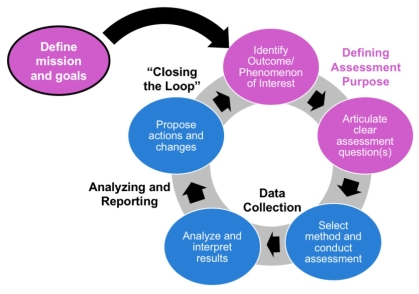Assessment Cycle
Whether you are evaluating student learning or operational outcomes, assessment is an iterative process that provides important feedback about what and how well your constituents are achieving the objectives of your programs, resources, and services. If followed and conducted intentionally, your assessment can be a very powerful tool to optimize learning and enhance the quality of your services. Read through each step in the assessment cycle below.

Steps in the Assessment Cycle
Set Program Outcomes (Define Mission and Goals)
Assessment begins with identifying goals and learning outcomes. Ask these questions when you begin planning for assessment.
- What am I trying to learn?
- What do I want to know?
- Why is this topic important?
- How will the outcomes of the research make change within the department?
The best goals are SMART.
- specific
- measurable
- aggressive
- realistic
- time-bound
When assessing outcomes it is crucial that the goals you are assessing are measurable.
Develop and Implement Assessment Strategy
Remember that continued programming and assessment can happen at the same time!
- Articulate clear assessment questions
- It’s important to ask clear and effective questions throughout the assessment. Get help with your assessment plan.
- Select method and conduct assessment
- Analyze and interpret results
- This is the fun part! You know the data you need to begin reviewing and understanding your results. Plan how you will analyze the data in an organized manner. Coding is one of the strategies used to set classification and identifications to like results.
- Propose actions and changes
- The actions and changes you propose should be aligned with the results of the assessment and the goals of the department. Consider what steps you could take to improve your assessment process as well.
Provide Program and Services
Continue with your programming and services as usual. Assessment should not stop and can be used in line with programming efforts. For example, if you are evaluating event attendance, continue having events throughout the academic year where you will assess the attendance.
After proposing actions to be taken, you can provide programs or services to align the actions with the department goals.
Determine Effectiveness and/or Assess Student Learning
Assessment is ongoing and should be continued in order to measure the effectiveness of the changes that you implemented.
Use Results for Continuous Improvement
Assessment and programming should be aligned, ongoing, and continuous. During this stage, it's necessary to:
- look back at your defined goals and mission,
- ensure your changes are aligned with the goals you initially defined, and
- continue to use assessment to check that those changes are meeting the needs of students.
References: University of California, Los Angeles Westminster College
